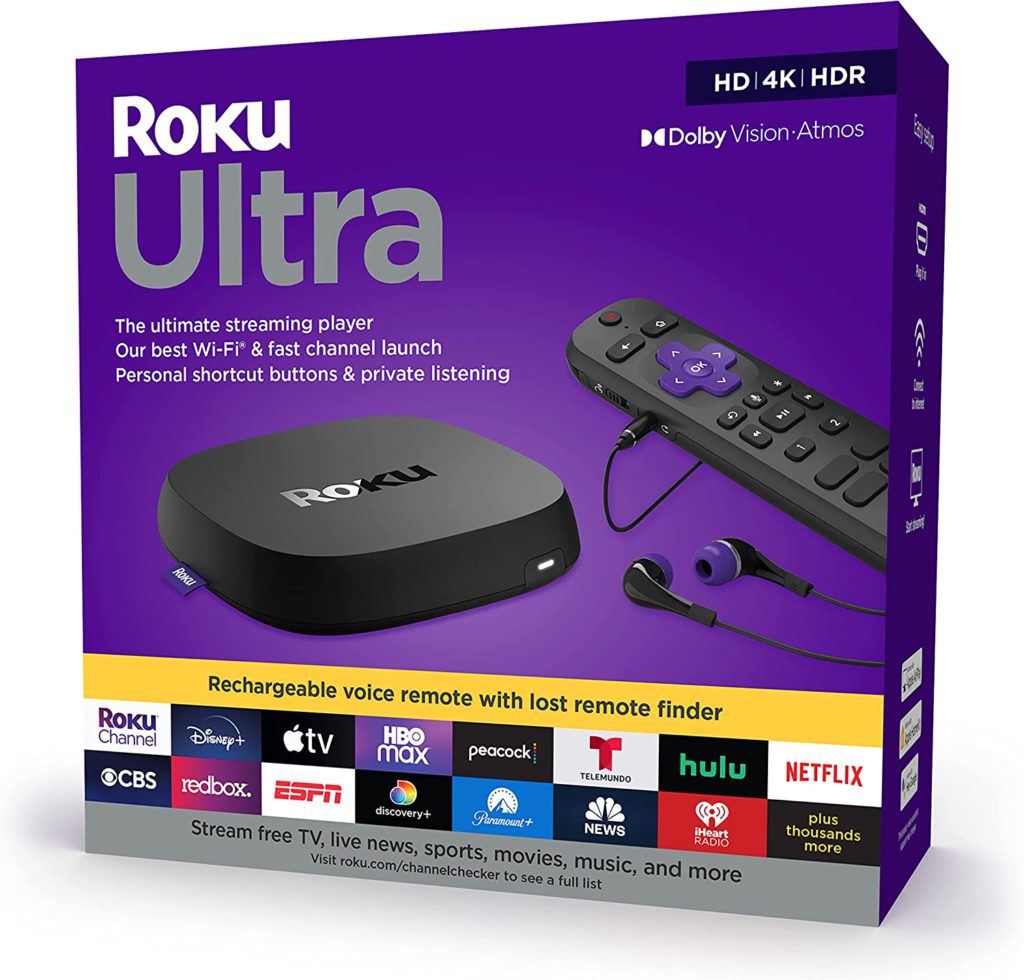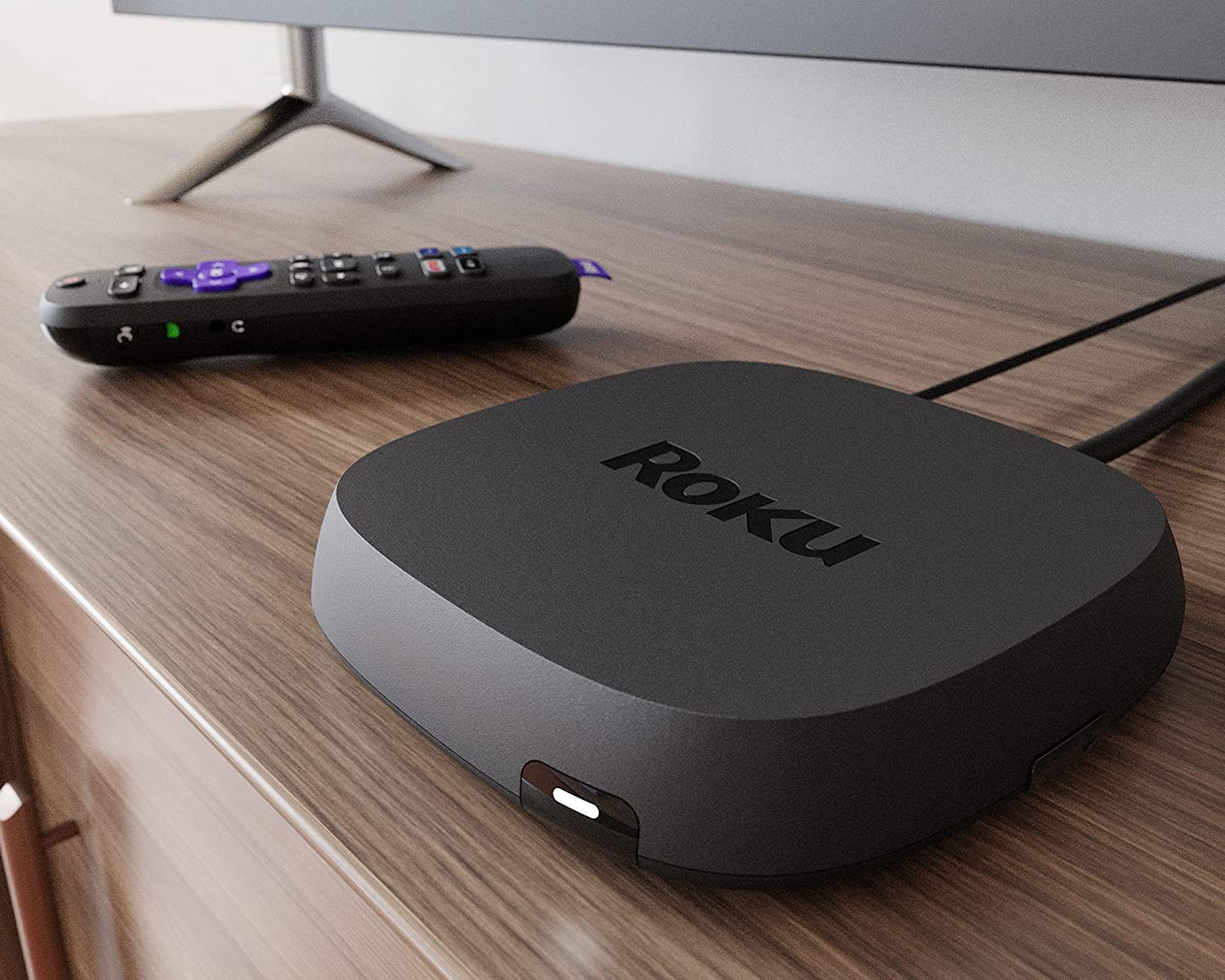*** TVReviewland.com earns commissions on qualifying purchases made through affiliate links ***
Roku TV is popular with regular consumers, cord-cutters, and tech enthusiasts. The brand’s reputation comes down to a simple, intuitive interface and reliable performance. Roku is also versatile; with the ability to fit into hardware of different shapes, sizes, and functionality. You can choose a pocket-size Roku stick, or you can find a soundbar that doubles as a Roku streaming device. There’s also a growing selection of budget and mid-range TV sets that run the Roku OS.
Already we see a few of the selling points of a product that started life as a set-top box. By comparing Roku to other smart TV platforms, this review helps you figure out the streaming option that works for you.
The Genesis of Roku TV
Netflix takes its place in history as a pioneer of the era of streaming services and streaming apps. For a time, the company’s business model involved mailing physical copies of movies to its subscribers.
Then came the inevitable increase in bandwidth and internet speeds for end users. Netflix could now use its online infrastructure for more than just fielding customer orders. The company could morph into a medium that delivers content directly to its subscribers’ computers. At this point, Netflix set about the business of creating a device that could deliver content directly to the TV.

This is where the first Roku streaming device comes into existence. First, the team at Roku creates an operating system that connects televisions to the internet. Then the company develops hardware to house and run the Roku OS. The end product is a combination of fast, lightweight software that is built to run on custom hardware. This is the first streaming device commissioned by Netflix and created by Roku.
For some reason, Netflix backs out of the hardware game to focus its resources on streaming and content. Roku forges forward with the product and the company achieves roaring success in the US market.
The Genesis of the Smart TV
Roku TV had competition from Amazon and Google streaming devices. The competing brands run their own proprietary software on their devices, with each platform offering its unique charms and downsides.
Consumers also have their choice of displays with integrated smart TV platforms. Samsung and LG produce TV sets with proprietary operating systems. Many other TV brands run Amazon, Google, and Roku platforms as third-party systems. This arrangement leaves such TV manufacturers to focus on hardware and outsource software, which is one way to cut costs. The tradeoff is that generic third-party software cannot leverage TV hardware the way that an in-house OS can.
This brief description paints the landscape of streaming devices and smart TV sets. Now we look at the usability and performance of Roku and the other operating systems.
Roku TV Versus Other Smart TV Platforms
The ideal streaming platform should offer a pleasant, stress-free user experience. Towards this end, a good streaming OS should check the following boxes:
- Ease of use
- Speed
- Longevity
- Minimal intrusions from ads
- Content
- Versatility and features
Here’s how the different platforms perform on each count:
1. Layout and Ease of Use
Roku has a no-frills home page with a layout that allows users to locate different menus with a quick glance. This design choice makes Roku TV popular among people who are more at home with the bare-bones interface of old-school displays.
LG’s WebOS comes a (somewhat) distant second in the layout department. In contrast, Google TV and Samsung’s Tizen have more complex interfaces that come with a learning curve for newbies. The clutter and complexity of the layouts may be a deal breaker for the shopper who likes to keep it simple.
A companion app and custom remote make the Roku platform even easier to use. However, the manufacturer has a strange habit of placing buttons on the side of the remote.
2. Speed, Reliability, and Longevity
The Roku OS is built with hardware in mind, with each variation of the software matching the configuration of specific devices. What you get is fast, lightweight software that delivers solid performance with every streaming app and every utility you use. The lack of bloatware only adds to the agility of Roku, and Google TV should take note.
Because of the superior build of Roku OS, many developers enjoy creating and maintaining apps for the platform.
It gets better, thanks to Roku’s long-term support for older versions of its software. Long-term support means that you get to make full use of your streaming device or Roku TV for many, many years. This is more than we can say for competing smart TV platforms that phase out software updates for older devices.
3. Ads and Other Intrusions
There’s no such thing as an ad-free viewing experience in the era of Google, Amazon, and the rest of them. This leaves consumers to settle for minimal, respectful advertising whenever they can get it. The good news is that Roku is one of the rare streaming platforms that keep intrusions to a tasteful minimum.
4. Content
Roku has a vast selection of streaming apps and hundreds of free channels to boot. The wealth of content makes Roku TV the ideal choice for cord-cutters and streaming veterans alike.
It’s worth mentioning that business conflicts between streaming apps and streaming platforms happen. These disagreements sometimes result in missing apps. You may find Apple software missing from the Google Play Store and vice versa. In the same vein, channels like HBO Max may be missing from the Roku store.
As far as available content goes, Roku has an advantage over the competition by virtue of its numerous free channels.
5. Bells and Whistles
For starters, Roku’s software is compatible with Siri, Alexa, and Google Assistant. The OS has a powerful voice control module that ensures accurate results from all three voice assistants. On this count, Roku outperforms much of its competition; yet again.
Voice assistants allow the Roku platform to function as a controller for compatible smart-home devices. Again, it’s worth mentioning that business disagreements between different companies may lead to missing apps. For example, disagreements cause Google Assistant to go missing from the Roku OS. The app tends to resurface after the two companies resolve their issues.
Roku TV has plenty going for it
It may have something to do with the fact that the powerful Roku OS is built with streaming hardware in mind. Maybe it’s the simple, well-behaved interface that keeps ads from hogging the screen and your attention. Whatever the reason, Roku TV remains a fan favorite with cord-cutters, tech nerds, and every market segment in between. Click here to learn more.
Read more:
Sonos Era 100 Review: Good Sound and Useful Features in a Small Frame
AKG Y600NC Wireless Review: Good Sound Quality at a Great Price
Bose A30 Review: Digital ANR and Increased Comfort
Philips T8506 Review: Top-End Ear Buds
Mario Movie 2023 Review: Couldn’t Be More Nostalgic



